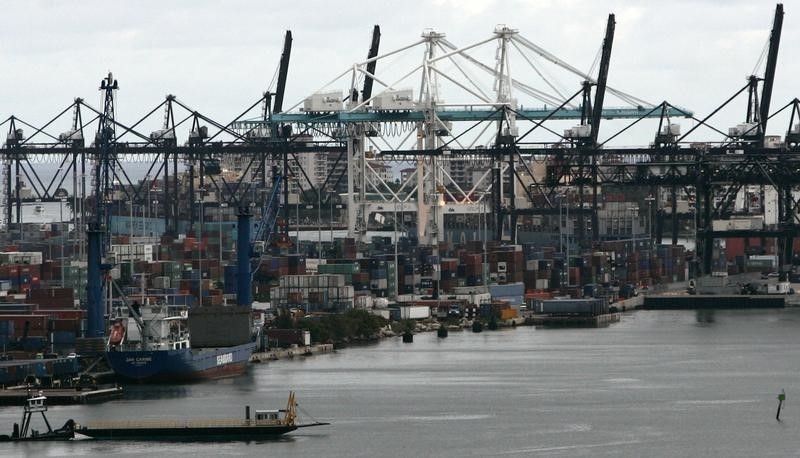By Jason Lange
WASHINGTON (Reuters) - U.S. exports took a hit from an ailing global economy in August and imports from China surged, fueling the largest expansion of America's trade deficit in five months.
The data released on Tuesday by the Commerce Department illustrates the U.S. economy's vulnerabilities to a strong dollar and weak demand in foreign markets, which could impose further caution on the Federal Reserve's plans to hike interest rates.
The trade deficit swelled by 15.6 percent to $48.3 billion in August, according to data that is adjusted for seasonal factors.
The scope of the increase was accentuated by the unusually narrow trade deficit registered in July. Also, imports likely got a temporary boost from inflows of cellphones ahead of the release of Apple's new iPhone model.
But the size of the trade gap has risen far above the average levels seen in recent years and the onus for stronger U.S. economic growth is now falling squarely on consumers.
"Trade will remain a drag on the real economy until well into next year," said Steve Murphy, an economist at Capital Economics.
Sales of U.S. goods and services abroad fell 2 percent to their lowest level since October 2012. Exports to Mexico fell by $1.5 billion in August and the European Union bought $500 million less from America than it did in July, according to data on bilateral trade which is not seasonally adjusted.
The declines are partly due to expectations of higher interest rates in the United States that have pushed the value of the dollar higher, reflecting the strength of America's economy relative to its trading partners. A stronger dollar makes U.S. goods less competitive abroad.
Weaker demand abroad is also playing a role, and U.S. Treasury Secretary Jack Lew will ask policymakers from other countries gathering in Lima, Peru this week to stimulate their economies to kick-start global growth.
The International Monetary Fund cut its global growth forecasts for the second time this year on Tuesday, citing weak commodity prices and a slowdown in China while warning that policies aimed at increasing demand were needed.
A 3 percent increase in U.S. imports from China also factored into the widening of the trade deficit. China's yuan currency has depreciated sharply in recent months amid concerns of a possible crash in the Chinese economy, which is the second largest in the world after America's.
The widening of the U.S. trade deficit surpassed the $47.4 billion median forecast for the deficit in a Reuters poll of economists.
Yields on U.S. government debt initially declined after the report was released, before later turning higher as U.S. stock prices were little changed.
Until recently it appeared that the U.S. economy was largely shrugging off weakness abroad. But last week new data showed a sharp slowdown in employment growth in August and September. This has fueled doubts on Wall Street over Fed Chair Janet Yellen's assertion two weeks ago that the economy would be strong enough to warrant an interest rate hike this year.
Trades made in futures markets now imply that investors are betting the Fed will hold off on hikes until at least March.
In August, imports rose 1.2 percent, even though America bought the least petroleum from abroad since September 2004.

Imports of consumer goods rose by $4 billion, of which slightly more than half the rise was due to increased purchases of cell phones and other household goods.